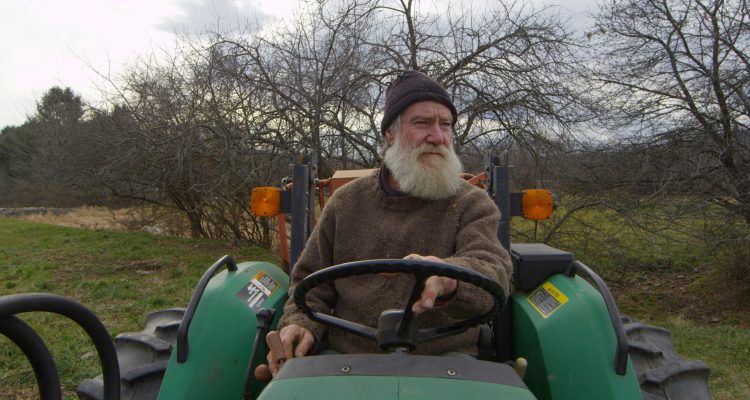To any passing outsider, Peter Dunning looks to be one hell of a farmer. In Tony Stone’s entertaining, heartbreaking documentary “Peter and the Farm,” the 68-year-old Dunning walks Stone and his small crew through some of what he has to do to keep his modest Vermont operation running; and his skill and dedication impresses. He bales hay, saws wood, slops hogs, herds sheep, slaughters and dresses his stock, and maintains his equipment, pretty much all by himself. He’s had wives and kids alongside him at various times during his decades of working the land, but they’ve all moved on. He keeps plugging away though, year after year, sensing what his property needs and doing what he can to provide.
It’s tough to describe the overall arc of “Peter and the Farm” though without making it sound unbearably depressing. Over the months that Stone spends following Dunning, he finds out that this scruffy loner isn’t Superman. Peter drinks too much, and he can be annoyingly bossy and judgmental. As he gets older and slower, his prickliness becomes a liability, because without loved ones around to support him, he can’t really keep up with all it takes to maintain a farm. There’s always another chore that needs doing, and it’s usually something he’s done so many times that it’s long-since lost its novelty.
Eons ago, Dunning had a notion that he’d divide his time between growing things and making art, but now he rarely paints or writes poetry. Instead, he just tries to get through another day of futilely beating back the encroaching wilderness. When a veterinarian confirms that Peter’s milk-cow is pregnant, the old man laughs ruefully and says, “That just locks me into having to farm more.” When he talks about his own inevitable demise, Peter tells Stone that he doesn’t want his ashes scattered on his land, because he’s already left enough of his body — in chunks and drips — all around the property. It’s all very sad, this crushing dissatisfaction with the life Dunning chose for himself.
But it’s really not hard to watch — except maybe for those who are squeamish about some of the earthier aspects of Dunning’s job. (Beware: “Peter and the Farm” contains scenes of gutting, castrating, unborn-calf-repositioning, and the production of huge, fresh piles of cow shit.) Peter himself has lived a full and fascinating life, and he’s articulate and reflective enough to tell his own story with flair. The artist in him even takes over after a while, and he starts to steer the film, suggesting better shots than the ones that Stone and his other cameraperson, Nathan Corbin, are getting.
Not that there’s anything wrong with the way “Peter and the Farm” looks. Stone and Corbin are unusually attuned to the visual textures of rural life: the mist over the hills, the dust particulates floating in sunbeams, the dank of the basement where Dunning ferments enormous glass jugs of hard cider, and so on. Editor Maxwell Paparella helps underscore the pastoral loveliness via several impressionistic montages, where disconnected snippets of some of Dunning’s drunken late-night ramblings play over gorgeously composed, naturally lit shots of barns, ponds, and animals.
The whole movie does this really, contrasting the idyllic qualities of Peter’s farm with the restlessness of Peter himself. Though the structure is designed to follow more or less the turning of the seasons — hitting its darkest, bleakest stretch during the chill of winter — the interviews jump around in Dunning’s biography. He talks about the patches of land on the farm where he conceived his children, and the good times he had with the women in his life, long before he explains that they all abandoned him because of his drinking. He drops references to serving in the military and sending time prison, and the camera occasionally catches a glimpse of his gnarled hand, but Dunning doesn’t elaborate on any of this until later in the film. Stone and his crew get the audience hooked on the mystery of this charismatic crank, and then take their time before they answer some of the bigger questions.
In the interim? A lot of farming. Even if Dunning weren’t such a captivating subject, it’d be a joy just to watch him work. He got into this business in a rush of hippie idealism, and through a lot of trial and error he’s learned about grafting, seed-saving, animal husbandry, and warding off predators. He went “back to the land” presuming that if he respected nature, the Earth would provide. Instead, nothing’s come easy. If he doesn’t keep detailed notes on his sheep, he can’t keep them alive. If he doesn’t drink rum in the middle of the night, he gets the shakes. If he doesn’t tell his family he loves them, they leave.
“Peter and the Farm” is more of a character sketch than a story, and as such it’s not wholly satisfying. There always seems to be more to find out about Dunning, and the movie ends without any reassurances that Peter’s going to be okay. Viewers who come to care about him over the course of the film’s 90 minutes can only take comfort in something Dunning says about the cycles of nature. “Life announces itself in force,” he insists, adding, “Death slinks off.” So long as Peter Dunning’s still angrily confronting another day of impossible toil, he keeps pushing death away. [A-]
This is a reprint of our review from the 2016 True/False Film Festival.

